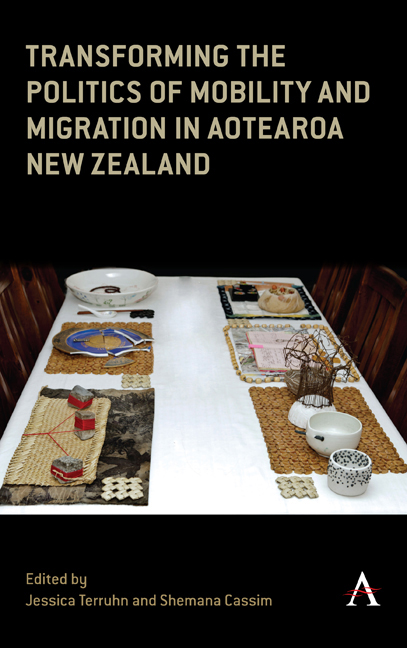Book contents
- Frontmatter
- Contents
- Acknowledgements
- Contributors
- Glossary of Te Reo Māori Words
- Glossary of Te Reo Māori Place Names
- Glossary of Other Non-English Words
- List of Tables
- List of Figures
- Introduction: Reimagining the Politics of Mobility and Migration Through Decolonisation, Social Justice and Solidarities
- Cover Artwork: A Place at the Kauri Table Revisited … 2021
- Part One Decolonising the Politics of Migration
- Part Two Humanising the Politics of Transnational Mobility
- Part Three Building Solidarities for Migrant Rights and Belonging
- Conclusion: Towards Transforming the Politics of Mobility and Migration in Aotearoa New Zealand
- Index
Nine - Feeling Like a Citizen: Refugee Rights and Everyday Experiences of Belonging in Aotearoa New Zealand
Published online by Cambridge University Press: 28 February 2024
- Frontmatter
- Contents
- Acknowledgements
- Contributors
- Glossary of Te Reo Māori Words
- Glossary of Te Reo Māori Place Names
- Glossary of Other Non-English Words
- List of Tables
- List of Figures
- Introduction: Reimagining the Politics of Mobility and Migration Through Decolonisation, Social Justice and Solidarities
- Cover Artwork: A Place at the Kauri Table Revisited … 2021
- Part One Decolonising the Politics of Migration
- Part Two Humanising the Politics of Transnational Mobility
- Part Three Building Solidarities for Migrant Rights and Belonging
- Conclusion: Towards Transforming the Politics of Mobility and Migration in Aotearoa New Zealand
- Index
Summary
Introduction
As global displacement increases, understandings of refugee citizenship rights and belonging have become particularly salient. In June 2021, the United Nations Refugee Agency, UNHCR, reported that the number of people forcibly displaced from their homes due to armed conflict, warfare and political persecution had reached 84.2 mil-lion – the highest figure ever recorded. While 48 million individuals were ‘internally displaced’, within their country of residence, 36 million had left their country and crossed international borders, where they wait in cities or refugee camps until they deem it safe to return home or they are forcibly repatriated (UNHCR 2021). Those who cannot return home may decide to seek asylum (protection from the state) in the country to which they first fled, or to apply for refugee status through the UNHCR (1996) in the hope that they might be resettled in a third country that is signatory to the 1951 Refugee Convention. However, only 107,800 asylum seekers and refugees were resettled in 2019 (Solf and Rehberg 2021). This number dropped to 34,400 in 2020 amid the Covid-19 pandemic, and by mid-2021, the United Nations had documented 26.6 million refugees in need of assistance, placing pressure on governments across the world to accept more refugees and offer more durable resettlement solutions (UNHCR 2021).
As one of the signatories to the Convention, Aotearoa New Zealand (hereafter, New Zealand) resettles refugees through an annual refugee quota. This quota has recently been increased due to the growing humanitarian crisis and significant activist pressure, such as the Double the Quota campaign (Stephens 2018a). A refresh of the 2013 New Zealand Refugee Resettlement Strategy is also underway (Bonnet 2021). The Strategy was originally implemented by the government, local non-governmental organisations (NGOs) and refugee background communities, with the vision that
refugees are participating fully and integrated socially and economically as soon as possible so that they are living independently, undertaking the same responsibilities and exercising the same rights as other New Zealanders and have a strong sense of belonging to their own community and to New Zealand. (New Zealand Immigration 2021a, no page)
This vision is further supported by five practical outcomes related to self-sufficiency, social participation, health and well-being, education and safe housing.
- Type
- Chapter
- Information
- Publisher: Anthem PressPrint publication year: 2023

